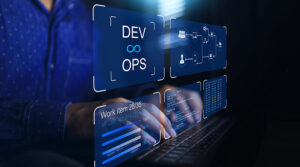DevOps, a portmanteau consisting of “development” and “operations,” is a software development methodology that has gained increased traction in the IT industry. DevOps uses tools, practices, and cultural philosophies that automate and integrate software development and information technology operations to speed up the evolution and development of new software products.
DevOps depends on continuous testing and continuous integration by developing automated CI/CD pipelines. So, the result of implementing DevOps is a CI/CD pipeline that benefits from the effective collaboration between the organization’s development and operations teams.
However, any sound methodology needs engineers to make things run smoother, and DevOps is no exception. To that end, this article presents a definitive DevOps engineer job description. It highlights a DevOps engineer’s responsibilities and roles, the technical skills a good DevOps engineer needs, and how a beginning or experienced DevOps engineer can develop those skills further, including by taking online DevOps programs.
Let’s start with defining the DevOps engineer and then build on that with a DevOps job description.
What Is a DevOps Engineer?
Put simply, a DevOps engineer ensures that the organization’s IT infrastructure runs smoothly. They monitor, manage, and improve communication between the developmental and operational aspects of the software development process. Additionally, a DevOps engineer’s primary duties include launching product updates, spotting production errors and related issues, and creating integrations to improve the customer’s experience.
The chief point of DevOps is to help companies streamline their software development process, thereby saving money and ensuring faster delivery of good software apps. The DevOps engineer is the person who helps and supports that process while ensuring that development and operations teams can stay in contact and collaborate effectively. The engineer is the glue that keeps the entire process together.
With the above in mind, let’s compile a comprehensive DevOps engineer job description.
Also Read: DevOps Metrics: Measuring DevOps Success
Presenting a DevOps Engineer Job Description
Let’s begin by reminding everyone that there is no single definitive DevOps engineer job description. These descriptions can vary based on the organization’s size, product line, and structure. However, the following job description touches on the most common aspects of the position.
A DevOps engineer is an IT professional who builds, tests, and maintains tools and infrastructure to develop and release software apps efficiently. They possess a deep knowledge of software development processes and lifecycles and are experts in the different automation tools used to develop CI/CD pipelines.
So, a DevOps engineer is an IT professional who works alongside developers and IT teams to monitor and facilitate code releases on a CI/CD basis.
DevOps Engineer Roles and Responsibilities
Now that we’ve established a solid DevOps engineer job description, let’s take a closer look at the specific roles and responsibilities of the DevOps engineer. As we mentioned earlier in our DevOps job description, the specific DevOps engineer roles and responsibilities can vary depending on a few mitigating factors, such as company structure, industry, and even the engineer’s experience level.
- Implementing various testing, development, automation tools, and IT infrastructures
- Planning the team structure, activities, and involvement in various project management activities
- Setting up tools and required infrastructures
- Selecting and deploying the appropriate CI/CD tools and performing any configuration management
- Defining and establishing test, development, release, update, and support processes for the organization’s DevOps operations
- Work towards continuous improvement while building continuous integration, continuous development, and constant deployment pipelines
- Possess the technical skills necessary to review, verify, and validate software codes developed in the project
- Implementing and maintaining monitoring stacks
- Maintaining and improving the organization’s cloud infrastructure
- Conducting system troubleshooting activities and fixing any found code bugs
- Monitoring the development processes during the whole lifecycle to ensure their adherence and creating or updating new processes and also minimize any waste
- Promoting and building automated processes wherever feasible
- Enhance the IT infrastructure’s security protocols by identifying and deploying needed cybersecurity measures by continuously conducting vulnerability assessment and risk management procedures
- Performing incidence management and root cause analysis
- Maintaining consistent coordination and communication within the team as well as with clients
- Mentoring and guiding the IT team members, addressing any concerns and issues
- Understanding customer requirements, monitoring, and measuring customer experience and their Key Performance Indicators (KPIs)
- Managing stakeholders and associated external interfaces
- Managing periodic reporting on project progress to the management, stakeholders, and customers
Now, let’s check out some tools that DevOps engineers rely on to perform these tasks and discharge their responsibilities.
Also Read: A Comprehensive List of Top DevOps Tools for 2024
Common DevOps Engineer Tools
Here are some everyday DevOps engineering tasks and the tools the engineers typically use.
- Source code management: GitHub.
- Developing CI/CD pipelines: CI/CD processes rely on specialized tools for automation, including Jenkins and GitLab CI.
- Testing: DevOps engineers use tools such as Selenium to help the engineer ascertain how their application turned out and to check for errors.
- Containerization: This task needs specific tools to build and configure containers that allow the software to work across different environments. These tools include Docker and Kubernetes, an open-source container-orchestration system.
- Configuration management: Tools include Puppet and Chef.
- Monitoring: Monitoring tools such as Nagios and Prometheus help the engineer screen the app and ensure it works as intended.
- Cloud platform integration: More organizations are turning to the cloud to run apps and store information over the web instead of in-house systems. Cloud suppliers include Amazon Web Services, Microsoft Azure, and Google Cloud Platform.
What Are the Essential Requirements and Skills for a DevOps Engineer?
Based on the extensive list of DevOps engineers’ roles and responsibilities, you can rightly assume that the role demands a specialized set of skills. DevOps engineers operate in a very complex, demanding, and critical environment. There’s a high demand for new software and apps, DevOps is supposed to facilitate that development, and the DevOps engineer is expected to make that design process run smoothly. Here is a selection of the critical requirements and skills a good DevOps engineer needs.
First, let’s look at education. Most potential employers seek a bachelor’s degree in a relevant discipline like computer science, computer engineering, computer information systems, information technology, software engineering, or a related discipline. It’s also useful for the DevOps engineer to have a strong background in data center migrations.
Next, although not mandatory, it helps for the DevOps engineer to have some appropriate certifications, which can be acquired through an online DevOps course or other online resource. We will explore a typical certification example later.
Additionally, typical requirements and skills (both hard and soft) you’ll find in a DevOps engineer job description include:
- Work experience as a DevOps Engineer or similar software engineer role
- Experience working on Linux-based infrastructures
- A working knowledge of various tools and open-source technologies
- Awareness of critical concepts in DevOps and Agile principles
- A good knowledge of Python, Java, Perl, or Ruby
- A solid understanding of configuring and managing databases (MySQL, Mongo) and SQL
- Experience in configuration management (e.g., Ansible, Chef, Puppet, or similar)
- A strong knowledge of cloud platforms such as Azure, AWS, or GCP, especially if the DevOps engineer is angling for a job with a company that relies heavily on cloud computing
- Managing production infrastructure using tools like Terraform, CloudFormation, etc.
- A problem-solving mindset
- Experience in project management
- A spirit of teamwork and cooperation
- Excellent troubleshooting skills
- Good communication skills are necessary for dealing with management, stakeholders, and clients.
Although requirements can vary depending on the company, DevOps engineers with a wide range of skills and knowledge stand a better chance of getting hired.
So, how do you get those necessary skills and improve them? Read on!
Also Read: How to Enable Virtualization: A Guide for Aspiring DevOps Professionals
A Guide to DevOps Training and Skill Development
When it comes to DevOps engineer skills, there are two imperatives: gaining the skills necessary to become a DevOps engineer and improving those skills once you’re in a DevOps engineer position.
In terms of initially acquiring those vital DevOps engineering skills, we’ve discussed getting a degree in a related field. This education could be a four-year bachelor’s degree or a two-year associate degree. In the latter case, you likely have to bolster your resume with online courses or hands-on experience.
Speaking of working experience, consider either an entry-level or intern position or, if you’re already involved in IT, volunteering to help with DevOps-related projects. People already working in an IT position in an organization have the advantage of already having a foot in the door, and it’s a matter of performing a lateral move into DevOps engineering. If you help with assorted DevOps engineering projects and tasks, you build connections, burnish your reputation, and, most importantly, gain skills by doing.
Let’s circle back to online courses and bootcamps. Many learning resources are available online to help you gain certification in DevOps disciplines. Certification shows a recruiter that you possess the necessary skills for the position, and that certificate becomes a piece of tangible proof of your knowledge. Also, DevOps bootcamps and related courses typically stand at the cutting edge of the latest DevOps advances, making them a good resource for upskilling and remaining current in the field.
Do You Want to Learn or Bolster Your DevOps Engineer Skills?
If you’re considering a career in DevOps engineering or a DevOps engineer looking to upskill to qualify for a DevOps engineer job description, consider this highly effective DevOps bootcamp. This 36-week online bootcamp will help you close the gap between software development and operations and help you choose hands-on skills through industry projects in continuous deployment and DevOps tools such as Ansible, Docker, Terraform, and Kubernetes.
According to Glassdoor.com, the typical DevOps engineer working in the United States makes a yearly average salary of $134,917. If you’re ready for a change in careers or enhancing your existing IT career and want to enter a field that challenges and rewards you, check into this DevOps post graduate program and expand your IT horizons.
You might also like to read:
How to Build a Successful DevOps Career Path? [2024 Guide]
A Definitive DevOps Engineer Job Description
DevOps Engineer vs. Software Engineer: Key Differences and Similarities






